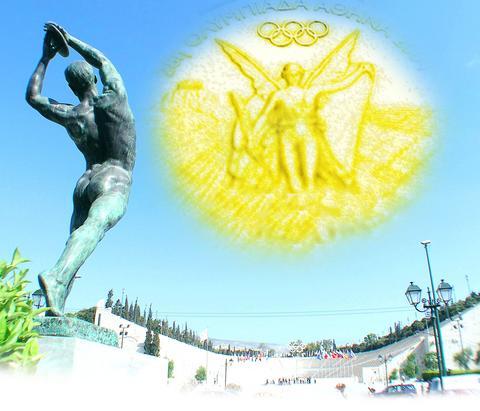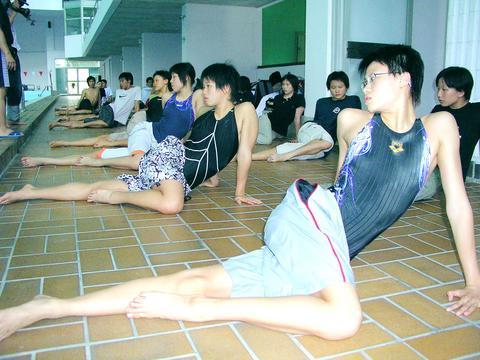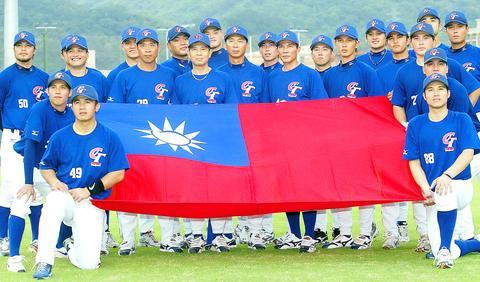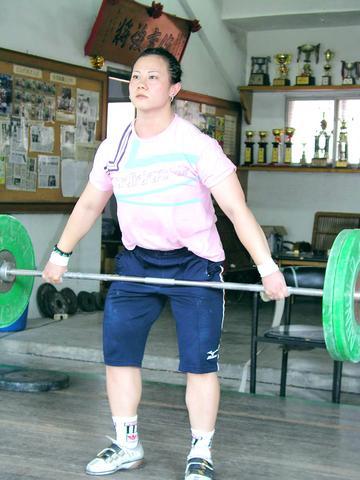As the clock ticks down to the opening of the Athens 2004 Olympic Games on Aug. 13, anticipation will be rising for the home team to pull off something that no Taiwanese athlete has managed before, namely bring home a gold medal.
There have been plenty of medals in the past -- silvers in weightlifting and taekwondo in Sydney and a silver in table tennis in Atlanta, to list a few -- but gold has remained out of reach throughout Taiwan's Olympic history and this year, it's hoped, will be the year to rectify the situation.
"There's no reason a Taiwanese athlete can't get a gold medal. We have great athletes, but it really boils down to their performance on the day of competition," said Steven Chen (陳士魁), deputy secretary general of the Chinese Taipei Olympic Committee.

PHOTO: TAIPEI TIMES
It might help this year that an unprecedentedly large team will be representing Taiwan at the Games, with 88 athletes competing in 14 events.
Part of the reason this year's Olympic team is so large is the inclusion of the baseball and softball teams, which between them account for 39 of the athletes and who carry on their shoulders much of Taiwan's high hopes for glory. Taiwan's baseball and softball teams are among the world's best, but when up against Cuba, the US, Japan and other powerhouses it's anyone's guess before the Games as to who will walk away the victors, Chen said.
As a measure of how important the baseball team is to this year's mission for gold, three of its players will carry the Chinese Taipei Olympic Committee flag onto the field at the opening ceremony leading the team, after Tajikistan's team and before Tanzania's. An agreement between the ROC government and the International Olympic Committee signed in 1981 stipulated that Taiwan would participate under the title Chinese Taipei, but that in the opening ceremony the team would appear in Taiwan's alphabetical position. Local spellings of country's titles are used to determine the alphabetical lineup of national teams.

PHOTO: TAIPEI TIMES
But baseball and softball are not the only events where Taiwan has high expectations of a strong finish. The other strong hopes for gold this year are in Taekwondo, weightlifting, archery and shooting.
Chu Mu-yen (朱木炎), an internationally top-ranked taekwondo athlete stands a good chance, as does Huang Shih-chun (黃世均) in the ladies weightlifting.
In other major events, however, like the track- and-field competitions, Taiwan won't even be sending competitors.

PHOTO: TAIPEI TIMES
"There isn't enough training for running and the other popular events, so there just aren't any good athletes in those categories," Chen said.
He cited the lack of appropriate locations to train athletes in endurance events, saying Taiwan's current Olympic training ground in Tsuoying, Kaohsiung County, will perhaps be supplemented in the future by a high-altitude training site and a seaside one to provide more targeted fitness regimens for specific events.
China's Olympic track-and-field and endurance sport athletes, for example, train at over 2,600m on the Tibetan plateau, which gives them a significant advantage when competing at sea-level stadia in Athens.

PHOTO: TAIPEI TIMES
But even if Taiwan's training facilities aren't ideal, Chen insists that this time the country's athletes won't be turning to performance-enhancing substances to compensate for any shortcomings, unlike at Sydney where one of Chinese Taipei's weightlifters gained the dubious distinction of being the first athlete ejected from that year's Games because of steroid use.
"Yes, some of the athletes use Chinese medicine concoctions, but we strongly recommend against it because you're never totally sure of what ingredients are used," Chen said. "There's very little leeway and the regulations are very strict, so are especially concerned about it this time," he said, pointing to a novella-sized rules book by the World Anti-Doping Agency, which was commissioned by the International Olympic Committee to enforce the Games' anti-performance enhancement drug policies.
The agency's regulations state that if three athletes from one country test positive for performance-enhancing substances then the entire team will be ejected.
To avoid any embarrassing mishaps, the Taiwanese athletes at Tsuoying are watched closely. Their diets are filled with meat, eggs and tuna -- essentially the same diet that the team will be eating at the Olympic Village, where all 5,000 participating athletes and delegation members will live during the duration of the Games. The Olympics commissioned out its cafeteria services to the US company Aramark for the 14th time since the 1968 Games in Mexico City. With that kind of experience, their team of cooks makes what Chen called "decent international food."
"Some of the athletes will take instant noodles, though, just in case," he said. "Otherwise they simply don't feel full."
Whether the diet, plus instant noodles and training will be enough to lift Taiwan to first-place glory remains to be seen. Taiwan's athletes will be competing each day of the Games and its strongest events are spread out throughout the 16 days of competition.
If a Taiwanese athlete does strike gold, crowds will get to listen to the ROC flag song, not the national anthem, as per regulations regarding Taiwan's participation in the Games. The use of the flag song is the down-side of the compromise with the International Olympic Committee that allowed Taiwan to appear in the opening ceremony under the letter T. Nonetheless, having it ring out at an award ceremony would still be a cause for joy, signaling as it would a gold medal.
"Wow, that would be a first," Chen said.

Taiwan has next to no political engagement in Myanmar, either with the ruling military junta nor the dozens of armed groups who’ve in the last five years taken over around two-thirds of the nation’s territory in a sprawling, patchwork civil war. But early last month, the leader of one relatively minor Burmese revolutionary faction, General Nerdah Bomya, who is also an alleged war criminal, made a low key visit to Taipei, where he met with a member of President William Lai’s (賴清德) staff, a retired Taiwanese military official and several academics. “I feel like Taiwan is a good example of

March 2 to March 8 Gunfire rang out along the shore of the frontline island of Lieyu (烈嶼) on a foggy afternoon on March 7, 1987. By the time it was over, about 20 unarmed Vietnamese refugees — men, women, elderly and children — were dead. They were hastily buried, followed by decades of silence. Months later, opposition politicians and journalists tried to uncover what had happened, but conflicting accounts only deepened the confusion. One version suggested that government troops had mistakenly killed their own operatives attempting to return home from Vietnam. The military maintained that the

Before the last section of the round-the-island railway was electrified, one old blue train still chugged back and forth between Pingtung County’s Fangliao (枋寮) and Taitung (台東) stations once a day. It was so slow, was so hot (it had no air conditioning) and covered such a short distance, that the low fare still failed to attract many riders. This relic of the past was finally retired when the South Link Line was fully electrified on Dec. 23, 2020. A wave of nostalgia surrounded the termination of the Ordinary Train service, as these train carriages had been in use for decades

Lori Sepich smoked for years and sometimes skipped taking her blood pressure medicine. But she never thought she’d have a heart attack. The possibility “just wasn’t registering with me,” said the 64-year-old from Memphis, Tennessee, who suffered two of them 13 years apart. She’s far from alone. More than 60 million women in the US live with cardiovascular disease, which includes heart disease as well as stroke, heart failure and atrial fibrillation. And despite the myth that heart attacks mostly strike men, women are vulnerable too. Overall in the US, 1 in 5 women dies of cardiovascular disease each year, 37,000 of them